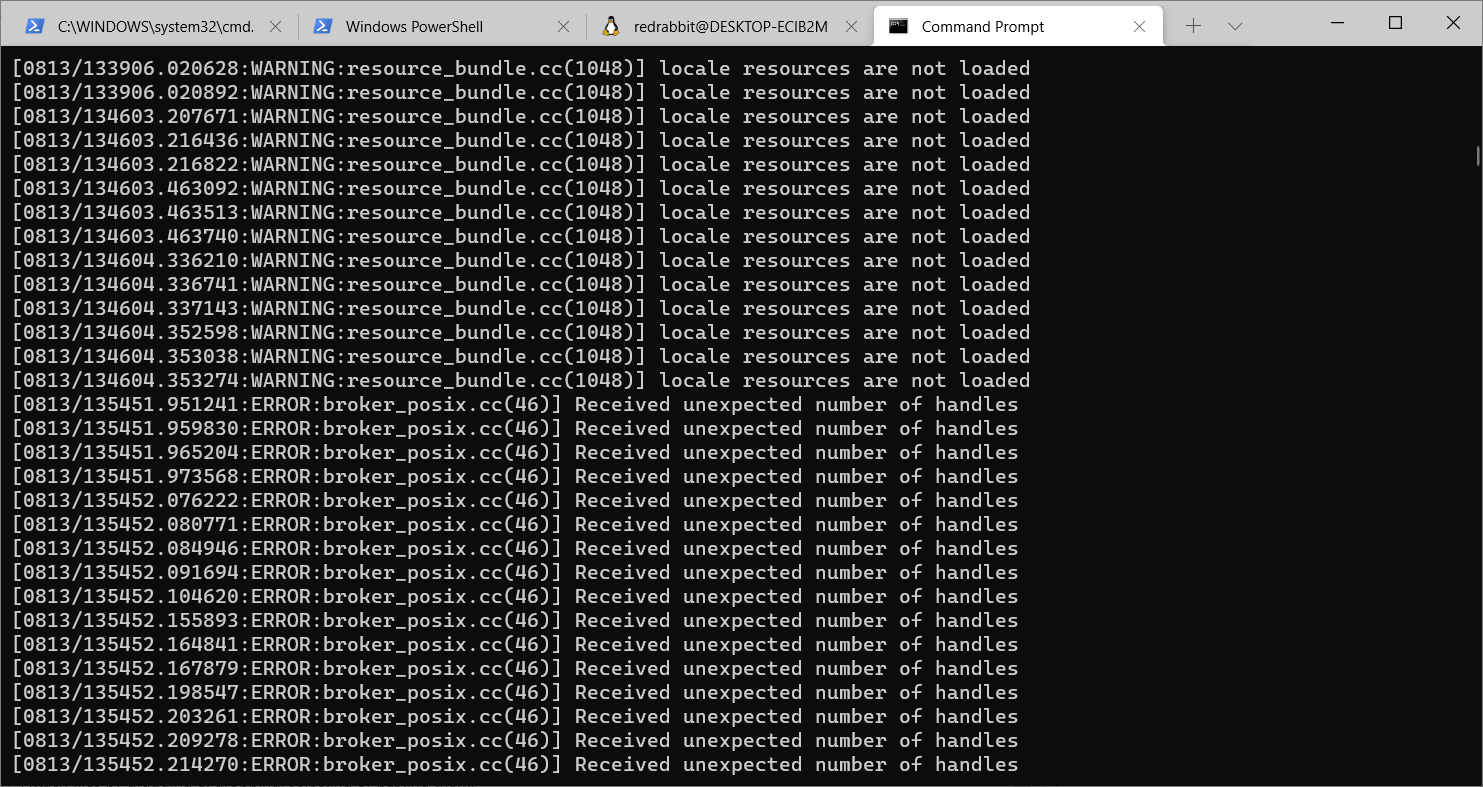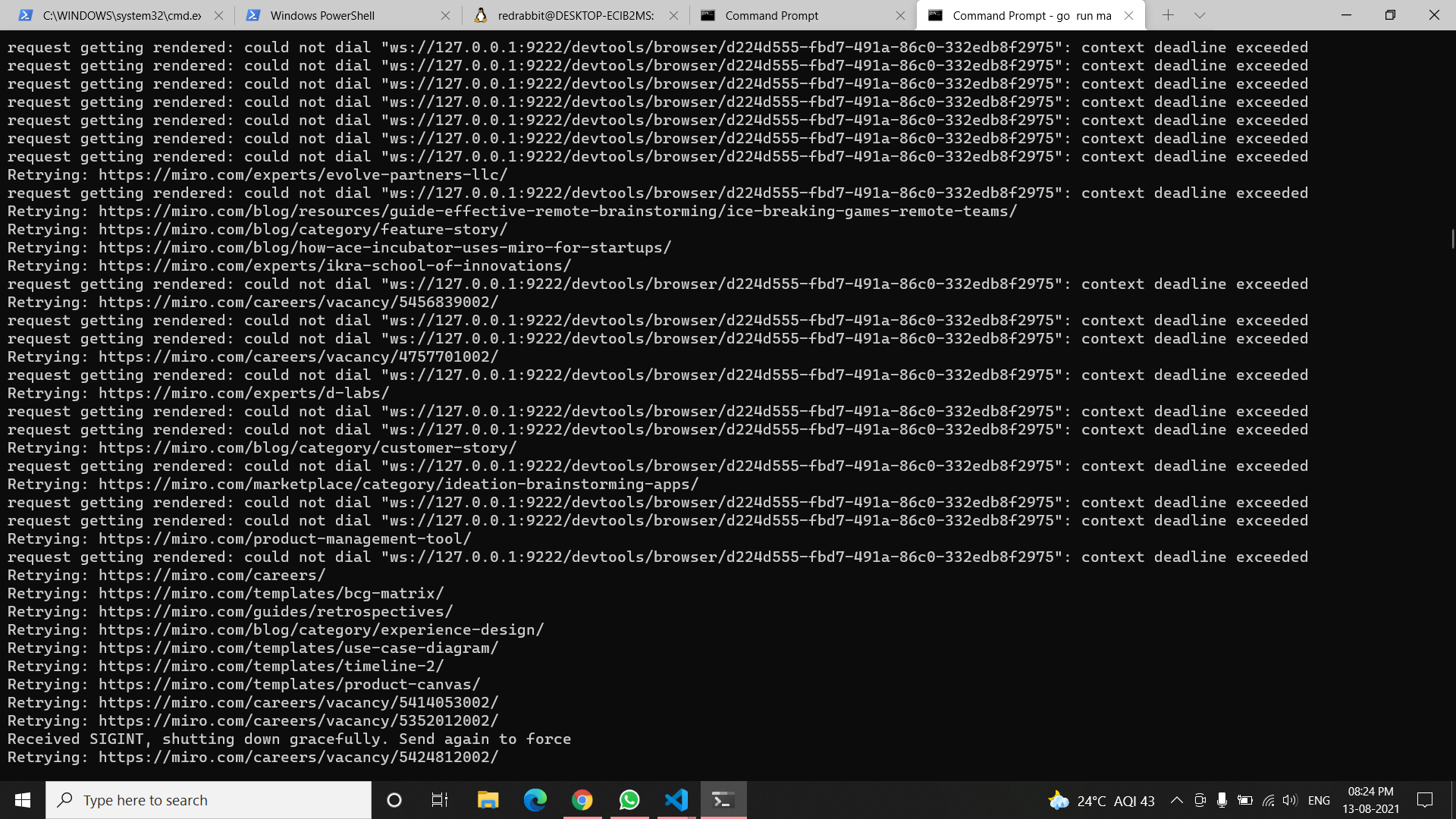Geziyor is a blazing fast web crawling and web scraping framework. It can be used to crawl websites and extract structured data from them. Geziyor is useful for a wide range of purposes such as data mining, monitoring and automated testing.
- JS Rendering
- 5.000+ Requests/Sec
- Caching (Memory/Disk/LevelDB)
- Automatic Data Exporting (JSON, CSV, or custom)
- Metrics (Prometheus, Expvar, or custom)
- Limit Concurrency (Global/Per Domain)
- Request Delays (Constant/Randomized)
- Cookies, Middlewares, robots.txt
- Automatic response decoding to UTF-8
- Proxy management (Single, Round-Robin, Custom)
See scraper Options for all custom settings.
We highly recommend you to use Geziyor with go modules.
This example extracts all quotes from quotes.toscrape.com and exports to JSON file.
func main() {
geziyor.NewGeziyor(&geziyor.Options{
StartURLs: []string{"http://quotes.toscrape.com/"},
ParseFunc: quotesParse,
Exporters: []export.Exporter{&export.JSON{}},
}).Start()
}
func quotesParse(g *geziyor.Geziyor, r *client.Response) {
r.HTMLDoc.Find("div.quote").Each(func(i int, s *goquery.Selection) {
g.Exports <- map[string]interface{}{
"text": s.Find("span.text").Text(),
"author": s.Find("small.author").Text(),
}
})
if href, ok := r.HTMLDoc.Find("li.next > a").Attr("href"); ok {
g.Get(r.JoinURL(href), quotesParse)
}
}See tests for more usage examples.
go get -u github.com/geziyor/geziyor
If you want to make JS rendered requests, make sure you have Chrome installed.
NOTE: macOS limits the maximum number of open file descriptors. If you want to make concurrent requests over 256, you need to increase limits. Read this for more.
Initial requests start with StartURLs []string field in Options.
Geziyor makes concurrent requests to those URLs.
After reading response, ParseFunc func(g *Geziyor, r *Response) called.
geziyor.NewGeziyor(&geziyor.Options{
StartURLs: []string{"http://api.ipify.org"},
ParseFunc: func(g *geziyor.Geziyor, r *client.Response) {
fmt.Println(string(r.Body))
},
}).Start()If you want to manually create first requests, set StartRequestsFunc.
StartURLs won't be used if you create requests manually.
You can make requests using Geziyor methods:
geziyor.NewGeziyor(&geziyor.Options{
StartRequestsFunc: func(g *geziyor.Geziyor) {
g.Get("https://httpbin.org/anything", g.Opt.ParseFunc)
g.Head("https://httpbin.org/anything", g.Opt.ParseFunc)
},
ParseFunc: func(g *geziyor.Geziyor, r *client.Response) {
fmt.Println(string(r.Body))
},
}).Start()JS Rendered requests can be made using GetRendered method.
By default, geziyor uses local Chrome application CLI to start Chrome browser. Set BrowserEndpoint option to use different chrome instance. Such as, "ws://localhost:3000"
geziyor.NewGeziyor(&geziyor.Options{
StartRequestsFunc: func(g *geziyor.Geziyor) {
g.GetRendered("https://httpbin.org/anything", g.Opt.ParseFunc)
},
ParseFunc: func(g *geziyor.Geziyor, r *client.Response) {
fmt.Println(string(r.Body))
},
//BrowserEndpoint: "ws://localhost:3000",
}).Start()We can extract HTML elements using response.HTMLDoc. HTMLDoc is Goquery's Document.
HTMLDoc can be accessible on Response if response is HTML and can be parsed using Go's built-in HTML parser
If response isn't HTML, response.HTMLDoc would be nil.
geziyor.NewGeziyor(&geziyor.Options{
StartURLs: []string{"http://quotes.toscrape.com/"},
ParseFunc: func(g *geziyor.Geziyor, r *client.Response) {
r.HTMLDoc.Find("div.quote").Each(func(_ int, s *goquery.Selection) {
log.Println(s.Find("span.text").Text(), s.Find("small.author").Text())
})
},
}).Start()You can export data automatically using exporters. Just send data to Geziyor.Exports chan.
Available exporters
geziyor.NewGeziyor(&geziyor.Options{
StartURLs: []string{"http://quotes.toscrape.com/"},
ParseFunc: func(g *geziyor.Geziyor, r *client.Response) {
r.HTMLDoc.Find("div.quote").Each(func(_ int, s *goquery.Selection) {
g.Exports <- map[string]interface{}{
"text": s.Find("span.text").Text(),
"author": s.Find("small.author").Text(),
}
})
},
Exporters: []export.Exporter{&export.JSON{}},
}).Start()You can create custom requests with client.NewRequest
Use that request on geziyor.Do(request, callback)
geziyor.NewGeziyor(&geziyor.Options{
StartRequestsFunc: func(g *geziyor.Geziyor) {
req, _ := client.NewRequest("GET", "https://httpbin.org/anything", nil)
req.Meta["key"] = "value"
g.Do(req, g.Opt.ParseFunc)
},
ParseFunc: func(g *geziyor.Geziyor, r *client.Response) {
fmt.Println("This is our data from request: ", r.Request.Meta["key"])
},
}).Start()If you want to use proxy for your requests, and you have 1 proxy, you can just set these env values:
HTTP_PROXY
HTTPS_PROXY
And geziyor will use those proxies.
Also, you can use in-order proxy per request by setting ProxyFunc option to client.RoundRobinProxy
Or any custom proxy selection function that you want. See client/proxy.go on how to implement that kind of custom proxy selection function.
Proxies can be HTTP, HTTPS and SOCKS5.
Note: If you use http scheme for proxy, It'll be used for http requests and not for https requests.
geziyor.NewGeziyor(&geziyor.Options{
StartURLs: []string{"http://httpbin.org/anything"},
ParseFunc: parseFunc,
ProxyFunc: client.RoundRobinProxy("http://some-http-proxy.com", "https://some-https-proxy.com", "socks5://some-socks5-proxy.com"),
}).Start()8748 request per seconds on Macbook Pro 15" 2016
See tests for this benchmark function:
>> go test -run none -bench Requests -benchtime 10s
goos: darwin
goarch: amd64
pkg: github.com/geziyor/geziyor
BenchmarkRequests-8 200000 108710 ns/op
PASS
ok github.com/geziyor/geziyor 22.861s


